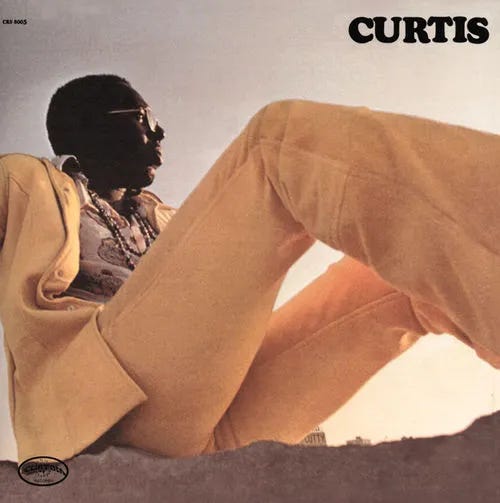Genre of the Day - Chicago Soul
Album of the Day - Curtis by Curtis Mayfield (1969)
April 15, 2024
If I was an oldhead, I’d probably start this article like so: men used to don suits and take a simple but effective album cover photo, then pour all of the aesthetic effort and heart into the music. Now, it’s the opposite: they focus on the visuals and the music gets sidelined. This would be cheesy, and not universally true, but it’s certainly a thought that came to mind upon listening to today’s album while gazing at its regal but simple cover. Where are these types of pointedly political musical statements from contemporary major music stars? Curtis Mayfield came out swinging from the outset of this album (if the slightly jarring first few lyrics are any indication). I fear we just don’t have that type of initiative across our media at the moment.
Contextually, it makes sense why Chicago soul of all genres at this time would be the one to produce such a compelling message on the dire social state of America. The fiery unraveling of the hope initially engendered by the Civil Rights movement found its epicenter in the city in the summer of 1968. A palpable malaise hung in the muggy air: two lights in Martin Luther King Jr. and Robert Kennedy had been slain in assassinations, racial tensions were at a high, and the Vietnam War was becoming universally hated among the youth. These tensions erupted into high-profile protests and clashes with police at the Democratic National Convention held in Chicago in August. The city embodied the gaping social rifts and pessimism in the US.
Before getting ahead of ourselves, we should look at what differentiates Chicago soul from other regional forms. We’ve covered the lush, lovestruck-but-let’s-keep-dancing sound of Philly soul already. Chicago favored rhythms and grooves that were a little harder, drawing from down south to do so, but it also was drawn to the sheen of nearby Motown. It’s probably best remembered label-wise for Chess Records and Vee-Jay Records (which actually was briefly the Beatles’ distributor in the US before they achieved cultural dominance). Like Philly, arrangements were meticulously arranged, with active horn sections and pillowy strings. The rhythms underneath were a little livelier.
With his debut solo album after breaking away from The Impressions, self-taught guitarist and driven lyricist Curtis Mayfield of angelic vocal provenance wielded the double-edged sword of soul to make a classic set. He balances the lovingness that traditionally denoted Chicago soul, and much of soul in general, with his political fire masterfully. From the album’s outset (“(Don’t Worry) If There Is A Hell Below, We’re All Going to Go)” he minces no words in calling to attention the racial division, drug abuse, and the beginning of the Nixon era’s screeching-halt approach to progress that were of detriment to social bonds. The end of the biting tune features frantic transmission as a musical calling to the disjointed chaos of the past few years. He continues this theme on the exploration of the stigma around the ghetto of “The Other Side of Town”, but still finds time for romance on the delicate, harp-ornamented “The Makings of You”, demonstrating the cross-regional soul impulse of incorporating unusual instruments. The danceable groove of the encouraging nine-minute odyssey of “Move on Up” is undeniable, and the ode to Black femininity on “Miss Black America” makes an equally important declaration. In a city racked by distrust, exhaustion, and tension, Mayfield’s relentless spirit to make change through music pushes through on this genre-defining classic. And he didn’t stop creating even after being paralyzed in 1990. Mayfield is arguably the beating heart of soul music off the strength of this album alone.





What an awesome deep dive!